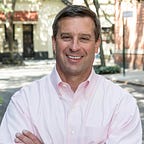When will we learn? Probably never.
A Year In and We Still Cannot Heed the Advice of Simple Science
Peter Diamandis is arguably one of the smartest people in the world. He’s the founder of the X-Prize and Singularity University among many other notable entrepreneurial endeavors.
When giving advice to others, we all think we are smarter than we are. And when it comes to following our own advice, it often seems we are all fools.
Was it arrogance, hubris, greed, or the desire for the spotlight that led Diamandis to host a super spreader event in January? We’ll probably never know. Diamandis probably doesn’t know, himself. All he knows is that he made a mistake — a mistake being repeated every day, because it seems we mere mortals are very, very bad at learning from the mistakes of others. It seems we have to repeat other’s mistakes before we can really learn.
What happened? Diamandis decided to host an in-person conference in California. And he decided that he was smarter than everyone else, concluding that if they followed HIS testing protocol, everyone would be safe. So, despite breaking multiple laws, he figured that be conducting extensive testing of his guests, he could run an event safely — and maskless. Now that it’s turned into a super-spreader event, he says that he hopes others can learn from his mistakes.
My question to him is this: “If a guy as smart as you couldn’t learn from the mistakes of those who came before you, why would you expect that others will learn from your mistakes?” Is that a realistic expectation?
If Diamandis really wants to put some of his research dollars to good use, perhaps THIS is the question most worst studying: “Why are humans so bad at learning from the mistakes of others and how can we improve our ability to learn?”
I most admit, I’m often guilty of the same thing. I often do stupid things that I’ve seen others do. Nonetheless, I’m intrigued by the question. Because if we can do a better job of learning from the mistakes of others, perhaps we can spend more time making new mistakes instead of repeating old mistakes. That would accelerate our learning as a society significantly.
The gathering that Diamandis hosted included approximately 80 attendees plus speakers/panelists and conference staff (audio visual, etc.). Those attending were asked to have a negative test before arriving and then both attendees and staff were tested multiple times. In all, they say they collected 450 negative tests and no positive tests during the event.
Then, two days after the event, a first person tested positive. Attendees were informed and it was recommended the be tested at home. A couple of weeks later, 32 people who attended the event had tested positive.
Because they thought they were in a “bubble” by virtue of all of the testing, attendees didn’t wear masks. On the other hand, one staffing company that had 35 people at the event who were told to wear their masks throughout the event reported zero cases.
Oh, and besides being a famed entrepreneur and scientist, it’s interesting to note that Diamandis is also a graduate of the Harvard Medical School.
This is an old story already. It’s repeated itself countless times over the past year. I am much less interested in why one more group of people though they were above the rules.
What really interests me is why we humans are so bad at learning from the mistakes of others.
It’s a question I cannot get out of my head.
